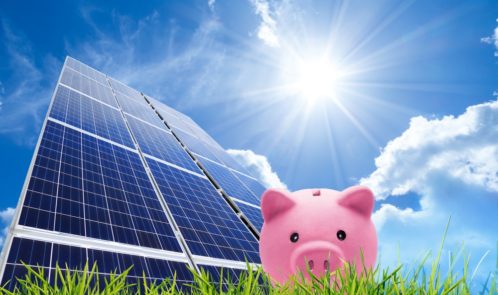Want to permanently reduce your household bills? Invest in solar panels

We installed our solar panels back at the end of 2015, but even though the Feed In Tariff has reduced, having panels can save you money long term, so I asked solar lighting specialist, The Solar Centre, to discuss how harnessing solar power throughout your home could mean huge long-term savings.
Whilst there are many ways that you can save money on day-to-day bills, consumers are, understandably, always on the lookout for long-term ways to make substantial savings. One way of doing this, while also being more environmentally responsible, is through solar power.
How does it work?
Solar panels work by capturing energy from the sun using photovoltaic cells. The cells convert sunlight into electricity, which can be used for home appliances and lighting, thus substantially reducing household bills. Once you have paid the cost for the initial installation, you will start to recoup electricity costs straight away. The panels do not actually need direct sunlight to work and can generate electricity even on overcast days.
What are the benefits?
One of the key benefits to fitting solar panels is that you get paid for every unit of energy you use and make money from energy you don’t use as well. The UK government’s Feed-in Tariff scheme pays you for the electricity you generate and if you’re out on a sunny day, not using any appliances, your electricity can also be sold back to the National Grid.
Every three months, you get a rebate from your power company – so purchasers benefit twice: firstly, by earning income from the sale of power to the Grid and secondly because they use less electricity.
How much are the potential savings?
Research has shown the average family usually requires a 4kWh solar panel system for their home. This alone would earn about £560 a year from a supplier just for producing solar electricity. Additionally, around £150 would be subtracted from their bills for using their own power, and they could make another £90 extra from selling power back to the National Grid via their energy provider.
While there is an initial cost to installing solar panels, this equates to a saving of about £800 a year once they have been fitted.
What about the ‘eco’ factor?
The big plus of solar power not to be forgotten, is that you are drastically reducing your carbon footprint. Solar is green renewable energy and doesn’t release harmful carbon dioxide or other pollutants into the environment. A home with solar panels installed could save around a tonne of carbon per year.
It is worth noting that to make your solar investment worthwhile you are going to need to stay in your property for at least eight years. However, with the possibility of £8,080 in savings over 20 years for solar panel productivity alone, it’s definitely something all households should start to consider more seriously.



Leave a Reply